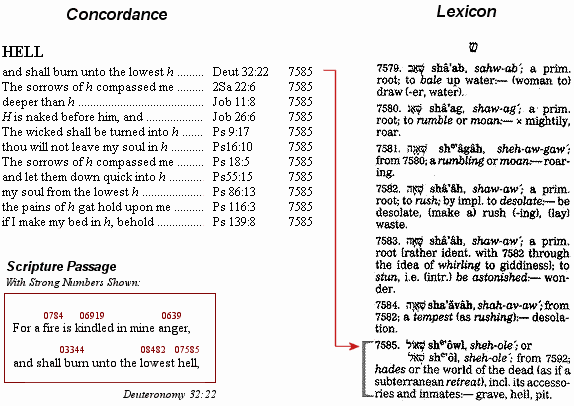|
What are Hebrew Word Studies?
A "word study" involves learning how a word (or phrase) was most likely used by a particular author when he/she wrote some kind of literary communication. Since we are interested in the words of the Hebrew Bible, performing a word study involves discerning how a given word was most likely used by an author of a particular book of the Tanakh.
At the outset, however, it should be noted that this is not a simple task, since words do not exist in a vacuum (that is, they are embedded in a historically conditioned "circle" of meaning that delineates the scope and meaning of terms), and discerning the intention of the original author through historical investigation is itself problematic. In fact, dictionaries or lexicons are themselves historical documents subject to their own interpretative principles regarding how a particular word was used in various contexts. In other words, simply looking up the meaning of a Hebrew word in a Biblical Hebrew dictionary is not enough to fully understand the meaning of the word.
Required Resources
For the layperson, performing a word study for a Biblical Hebrew word will minimally involve using the following resources:
- The Hebrew text (or an interlinear English-Hebrew text). If you know very little Hebrew you may also use an English translation with words keyed to Strong numbers (such as the AMG Hebrew Key Word Study Bible).
- A Hebrew Lexicon (for the definition and etymology of the selected word).
- A Concordance (for the frequency and the range of usage for the selected word).
- Other Bible Research Tools
Each of these resources is explained below.
1. The Hebrew Text
The Hebrew text, of course, is the starting point for your work, since this is the literature that is under investigation. The Biblia Hebraica Stuttgartensia (BHS) is the scholar's first choice for studying the Hebrew Masoretic text. The BHS includes the scholarly apparatus (i.e., masoretic notes and textual criticism additions) required for doing advanced research. Consider this version mandatory if you are intending on publishing your work in scholarly journals.
Many people (myself included) have found The Interlinear NIV Hebrew-English Old Testament, by John Kohlenberger to be of great assistance when doing word studies. This work includes the BHS text (with major textual conjectures in footnotes) but provides the English translation (unfortunately, the NIV) underneath the Hebrew. This is handy for finding the word of interest while reading passages in the English. Another alternative is to use J.P. Green's Interlinear Hebrew-Greek Bible.
If you know very little Hebrew you may use an English translation with words "keyed" to the Strong numbering system, such as the Hebrew-Greek Key Study Bible (KJV and NASB only). Over 100 years ago, Dr. James Strong indexed each biblical word and assigned a unique number to it. This number was then correlated to a dictionary of biblical terms so that a basic definition could be found simply by looking the number up in the dictionary. Using the Strong dictionary and other research tools that use Strong numbers (such as the Theological Wordbook of the Old Testament (TWOT), the Englishman's Hebrew Lexicon and Concordance, The Brown-Driver-Briggs Hebrew-English Lexicon, among others), you can perform word studies using only English.
Finally, you can use computer-based research tools such as BibleWorks, Accordance, or various web services. These tools often provide a Hebrew-English interlinear mode as well as Strong numbers with the English text. Personally I would recommend BibleWorks as the best computer-based application for doing serious word studies of the Hebrew (or Greek) text.
2. Hebrew Lexicons
You will need a Hebrew lexicon (dictionary) in order to get a fuller understanding of a given word's "intension" and "extension" within the Scriptures. The following tools all are coded to the Strong numbers so that you can perform more in-depth analysis:
|






